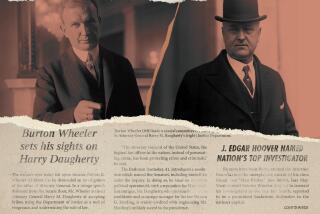Hugh D. Graham, 65; Scholar Challenged Bush on Records
Hugh Davis Graham, a Vanderbilt University political historian who spearheaded a lawsuit to block President Bush’s reinterpretation of a law on the release of White House records, has died. He was 65.
Graham, a highly regarded scholar of civil rights policy and a Pulitzer Prize-nominated author, died of cancer Tuesday at his home in Santa Barbara.
In November, he and a group of other historians and journalists asked a federal judge to strike down Bush’s executive order that gives an incumbent president or a former president’s representative the right to withhold the release of their presidential papers to the public. The order also extends to “vice presidential records.”
Immediately at issue were 68,000 pages of “confidential communications” from President Reagan’s White House.
Graham and his fellow plaintiffs argued that Bush’s executive order violated the 1978 Presidential Records Act, which was passed by Congress to make clear that a president’s papers and files are the government’s property.
The measure was enacted in the wake of Watergate and President Nixon’s efforts to control access to his papers and secret White House tapes.
The law, which took effect in 1981, said most of a former president’s papers would be available to the public 12 years after the chief executive left office.
A White House spokeswoman in November described Bush’s executive order as “establishing an orderly process” for implementing the 1978 law.
“Bush’s order is wrongheaded and dangerous on many counts,” Graham told an audience at the Lyndon Johnson Presidential Library in Austin, Texas, in November. “It attempts to change a public law not by persuading Congress to revise it, but by executive decree. It is disingenuous, turning the statute on its head, displacing a premise of eventual openness with a license for permanent closure.”
In January, a year after they were scheduled to be made public, 8,000 pages of Reagan presidency documents were unveiled at the Ronald Reagan Presidential Library in Simi Valley, including memos from Chief of Staff James A. Baker III. An additional 60,000 pages that were to be released in January 2001 are expected to become available in early April.
Graham viewed the release of the Reagan papers as a mere public relations ploy to curb criticism over Bush’s executive order.
“It’s a gesture so that they can say, ‘See, we’re good guys, we’re producing these documents and everyone can come look at them,’” Graham said in January. “They’re trying to get the monkey off their back. But it’s not going to get us off their backs.”
The lawsuit, filed in Washington on behalf of the American Historical Assn., the Organization of American Historians, the National Security Archive and the Reporters Committee for Freedom of the Press, in addition to Graham and Stanley I. Kutler of the University of Wisconsin, is pending.
A native of Little Rock, Ark., Graham graduated magna cum laude from Yale University in 1958 and later received his master’s and PhD from Stanford University.
After a two-year stint in the Marine Corps on Okinawa, Graham worked briefly as a reporter for the Tennessean in Nashville in 1960 then taught history at Foothill College in Los Altos Hills, Calif., and at San Jose State College (now University).
From 1964 to 1966, he worked in the Peace Corps in Washington, first in the Office of Public Affairs and then as director of the Western region. He later taught history at Stanford, Johns Hopkins University in Baltimore and the University of Maryland.
Graham began teaching at Vanderbilt in Nashville in 1991, but he moved to Santa Barbara early last year after his illness rendered him unable to teach.
He continued to write, however, and finished his final book, “Collision Course: The Strange Convergence of Affirmative Action and Immigration Policy in America,” which has just been published by Oxford University Press.
Graham wrote or edited 15 books, mostly dealing with U.S. policy issues in the second half of the 20th century.
He was a finalist for the Pulitzer Prize in history in 1991 for “The Civil Rights Era: Origins and Development of National Policy, 1960-1972.”
This week, an academic conference on Reagan’s presidency that Graham helped organize was held at UC Santa Barbara.
Graham is survived by his wife, Janet; two brothers, Court TV anchor Fred Graham of Washington and historian Otis L. Graham Jr. of Wilmington, N.C.; and his son, Holter Graham of Baltimore. Another son, Hugh Patterson Graham, died in 1977 at age 8.
A memorial service will be held later at Vanderbilt.
More to Read
Sign up for Essential California
The most important California stories and recommendations in your inbox every morning.
You may occasionally receive promotional content from the Los Angeles Times.










